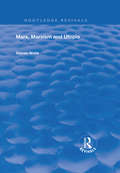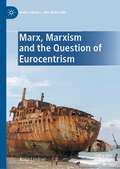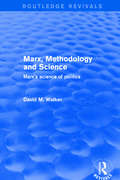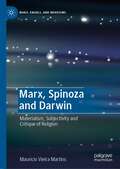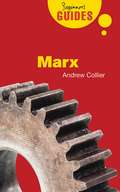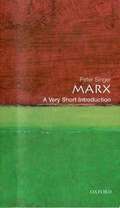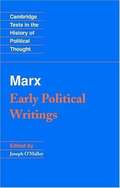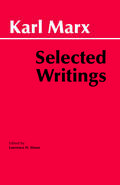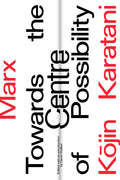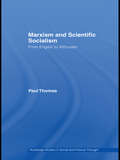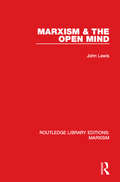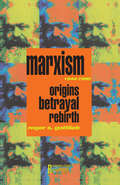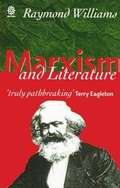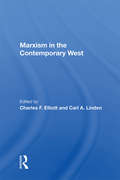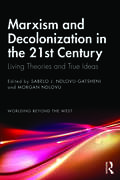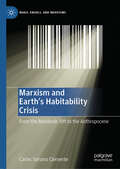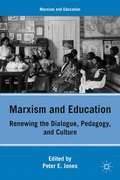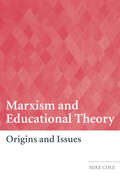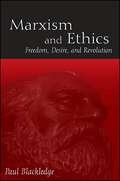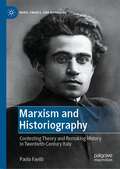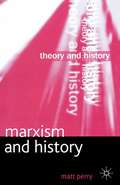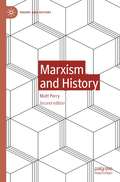- Table View
- List View
Marx, Marxism and Utopia
by Darren WebbThis title was first published in 2000: This engaging book suggests that Marx was right to reject 'utopian socialism' on the grounds that it undermined the principles of proletarian self-emancipation and self-determination. As a theoretician of the proletarian class, Marx sought to capture the spirit of revolution in a manner which precluded the need for utopian philanthropy and the messianic elitism which invariably accompanied it. In a powerful and original central argument, the book suggests that the categories which together define Marx’s own 'utopia' were nothing more than theoretical by-products of the models employed by Marx in order to supersede the need for utopianism. As such, Marx was an 'accidental' utopian. Rather than legitimating utopianism, however, the author argues that this conclusion reinforces the need to develop Marx’s anti-utopian project further. Emphasising the contemporary relevance of Marx’s original critique, the conclusion suggests that the future of socialism lies in its ability to harness, not the spirit of utopia, but the spirit of adventure.
Marx, Marxism and the Question of Eurocentrism (Marx, Engels, and Marxisms)
by Kolja LindnerThis book mediates between postcolonial positions that criticize Marxist approaches (and Marx’s writings) for their Eurocentrism and defenders of Marx, who claim that this accusation is a myth. In different contributions to this volume, Kolja Lindner pleads for a differentiated assessment of the whole of Marx’s work, including less known manuscripts, and a theoretical reconstruction of various elements that have come into the focus of postcolonial critique: ethnocentrism, Orientalism, false universalism and the oblivion of modernity’s global entanglement. Against this background, two opportunities simultaneously arise: Marx’s Eurocentrism can be deconstructed and his growing awareness of global developments and cosmopolitan struggles established.
Marx, Methodology and Science: Marx's Science of Politics
by David M. WalkerThis title was first published in 2001. The book aims to give a clear and accessible account of Marx’s method and an assessment of its scientific validity and relevance to contemporary social science; The key methodological themes of Marx’s work and their development are shown with particular attention paid to the elements of dialectics and materialism; Four models of science are outlined-positivism; critical rationalism; scientific conventionalism; scientific realism - and the arguments and evidence both for and against Marx’s method corresponding to any of them examined. The conclusion arrived at is that Marx’s method is a good example of social scientific practice according to the scientific realist model and that it has a positive contribution to make to social science today.realism.
Marx, Spinoza and Darwin: Materialism, Subjectivity and Critique of Religion (Marx, Engels, and Marxisms)
by Mauricio Vieira MartinsMarx, Spinoza and Darwin presents a common thread in its argument: it shows how these authors—certainly with differences among themselves—consolidated a field of investigation that does not resort to transcendent or religious premises in approaching the phenomena they analyze. Thus, when Spinoza declared that the “will of God” is the “sanctuary of ignorance,” when Marx provocatively maintained that “criticism of religion is the premise of all criticism,” or when Darwin polemicized against a millennial creationist approach, all were taking a stand that invited us to view our world through a secular and immanent lens. In addition to this common thread, Martins discusses other issues present in the works of these thinkers, for instance the space that exists for human subjectivity from a Marxist perspective (which is not to be confused with philosophical “objectivism”): men and women are encouraged to act in the world. With this conceptual background, the concluding chapters of the book address the proliferation of some less examined Christian fundamentalisms in contemporary world, presenting an explanatory hypothesis for the phenomenon.
Marx: A Beginner's Guide (Beginner's Guides)
by Andrew CollierBreathing new life into the achievements of Karl Marx, this accessible and jargon-free introduction is a timely reminder of his undiminished influence. Andrew Collier's engaging text not only introduces the reader to Marx the revolutionary, but also redefines him as one of the first truly democratic thinkers. In a concise yet searching manner, Collier covers all the elements of marxist thought, from the early writings to such major texts as 'Capital' and the key themes of labour and society. Punctuating his study with a wide range of examples, from Aristotelian thought to Thatcherite policy, he explores the traditional notion of Marx the activist, while probing the apparent inconsistencies in his work and reclaiming his place as a philosopher and political theorist. Concluding with a thought-provoking assessment of Marx's pervasive influence on the political landscape of the twenty-first century. Collier's study highlights our own global inequalities and will be warmly welcomed by students, scholars and activists from a variety of backgrounds.
Marx: A Very Short Introduction
by Peter SingerMarx wrote at such enormous length, on so many different subjects, that it is not easy to see his ideas as a whole. I believe that there is a central idea, a vision of the world, which unifies all of Marx's thought and explains what would otherwise be puzzling features of it. In this book I try to say, in terms comprehensible to those with little or no previous knowledge of Marx's writings, what this central vision is.
Marx: Bullet Guides
by Robert AndersonOpen this book and you will: - learn about Marx's life - know his key works - deal with dialectic - assess his influence
Marx: Bullet Guides
by Robert AndersonOpen this book and you will: - learn about Marx's life - know his key works - deal with dialectic - assess his influence
Marx: Early Political Writings
by Karl Marx Richard A. Davis Joseph O'MalleyThe political doctrine of Karl Marx is to be found in a broad range of both published and unpublished writings. This volume, the first of two which together span his entire output, presents his early texts of 1843–7, which predate the Communist Manifesto. excerpts from the Critique of Hegel's Philosophy of Right and from the Paris Notebooks, Points on the State and Bourgeois Society and other writings are newly translated and arranged in a sequence that illuminates the development of Marx's thought, while the introduction discusses the intellectual context of the theories he constructed. A chronology of Marx's life and career and an annotated bibliography complete a volume which will be an invaluable guide to the formation of one of the most influential doctrines in the history of political thought.
Marx: Later Political Writings
by Karl Marx Terrell CarverMarx: Later Political Writings brings together the most important texts in political philosophy written by Marx after 1848. All are in new translations, and the collection is introduced by the leading Marx scholar Terrell Carver. Unlike other collections, the works are presented complete, according to their earliest edition or manuscript text, and include the Manifesto of the Communist Party, and the little-known Notes on Adolph Wagner. These texts allow the close contact between Marx and contemporary politics to emerge in a clearer light.
Marx: Selected Writings (Hackett Classics)
by Karl Marx Lawrence H. SimonFeaturing the most important and enduring works from Marx's enormous corpus, this collection ranges from the Hegelian idealism of his youth to the mature socialism of his later works. Organized both topically and in rough chronological order, the selections (many of them in the translations of Loyd D. Easton and Kurt H. Guddat) include writings on historical materialism, excerpts from Capital, and political works.
Marx: Towards the Centre of Possibility
by Kojin KarataniClassic study of Marx by Japan's leading critical theoristOriginally published in 1974, Kojin Karatani's Marx: Towards the Centre of Possibility has been amongst his most enduring and pioneering works in critical theory. Written at a time when the political sequences of the New Left had collapsed into crisis and violence, with widespread political exhaustion for the competing sectarian visions of Marxism from 1968, Karatani's Marx laid the groundwork for a new reading, unfamiliar to the existing Marxist discourse in Japan at the time. Karatani's Marx takes on insights from semiotics, deconstruction, and the reading of Marx as a literary thinker, treating Capital as an intervention in philosophy that could be read as itself a theory of signs. Marx is unique in this sense, not only because of its importance in post-68 Japanese thought, but also because the heterodox reading of Marx that Karatani debuts in this text, centered on his theory of the value-form, will go on to form the basis of his globally-influential work.
Marxism & Scientific Socialism: From Engels to Althusser (Routledge Studies in Social and Political Thought)
by Paul ThomasEngels declared at Marx’s funeral in Highgate Cemetery that "just as Darwin discovered the law of development of organic nature, so Marx discovered the law of development of human history". Scientific socialism was the term Engels used to describe Marx's socio-economic philosophy and many later theorists sought to reinforce Marxist theory with a supposedly scientific basis. This book explains the development of the idea of scientific socialism through the 19th and 20th century from its origins in Engels to its last manifestation in the work of Althusser. It provides a detailed analysis of Engel's own conceptualisation, the impact of Darwin, the relationship to the 'official' historical materialism of the Soviet states and later reformulations by Althusser and others. In so doing it provides a vivid intellectual history of Marxist and socialist thought, exploring its significant insights as well its manifest failures. Marxism and Scientific Socialism will be of particular interest to those with an interest in the development of Marxism and socialism, political ideologies and the history of Western political thought.
Marxism & the Open Mind (Routledge Library Editions: Marxism)
by John LewisIt has been said that the normal English reaction to uncomfortable facts of life, such as Marxism, is an embarrassed but determined silence. That anyone should experience a desire to enquire into ideas as such, and to probe into the motives influencing them, seems extraordinary. Marxism is, however, subjected to a close study in this book, first published in 1957, and the collected essays attempt the task of combining certain elements in the heritage of modern culture with the insights of Marxism. There can be no vital thinking for our age that does not do justice to both traditions.
Marxism 1844-1990: Origins, Betrayal, Rebirth (Revolutionary Thought and Radical Movements)
by Roger S. GottliebFirst Published in 1992. Routledge is an imprint of Taylor & Francis, an informa company.
Marxism And Literature
by Raymond WilliamsThis book extends the theme of Raymond Williams's earlier work in literary and cultural analysis. He analyses previous contributions to a Marxist theory of literature from Marx himself to Lukacs, Althusser, and Goldmann, and develops his own approach by outlining a theory of `cultural materialism' which integrates Marxist theories of language with Marxist theories of literature. Williams moves from a review of the growth of the concepts of literature and idealogy to a redefinition of `determinism' and `hegemony'. His incisive discussion of the 'social material process' of cultural activity culminates in a re-examination of the problems of alignment and commitment and of the creative practice in individual authors and wider social groups.
Marxism In The Contemporary West
by Charles F. ElliottWhat is the relationship between Marxist ideology and the politics of the contemporary West? The contributors to this book treat this question expansively, examining Marxism and the activities of European and Latin American communist parties in the broad context of contemporary Western politics. Their discussion encompasses not only political and p
Marxism and Decolonization in the 21st Century: Living Theories and True Ideas (Worlding Beyond the West)
by Sabelo J. Ndlovu-GatsheniMarxism and Decolonization in the 21st Century is a ground-breaking work that highlights the resurgence and insurgence of Marxism and decolonization, and the ways in which decolonization and decoloniality are grounded in the contributions of Black Marxism, the Radical Black tradition, and anti-colonial liberation traditions. Featuring leading and young scholars and activists, this book is a practical scholarly intervention that shows how democratic Marxism and decoloniality might converge to provoke planetary decolonization in the 21st century. At the centre of this process, enabled by both increasing human entanglements and the resilience of racism, the volume's contributors analyse converging forces of anti-imperialism, anti-colonialism, anti-patriarchy, anti-sexism, Indigenous People’s movements, eco-feminist formations, and intellectual movements levelled against Eurocentrism. This book will be of great interest to students, scholars, and intellectuals interested in Marxism, decolonization, and transnational activism.
Marxism and Earth's Habitability Crisis: From the Metabolic Rift to the Anthropocene (Marx, Engels, and Marxisms)
by Carles Soriano ClementeThis book argues that as long as capitalism is globally dominant, there must be a crisis of habitability on Earth. Overcoming this crisis is not a matter of technology. Technological strategies need to be adopted to mitigate human impact on Earth, but as long as they are implemented on a capitalist basis the crisis will not be overcome. Unfortunately, this is not fully understood today, and initiatives to confront the crisis based on idealism and positivism flourish everywhere. This makes research into the main epistemological reasons for the misunderstanding of the relationship between the reproduction of capital and the crisis of habitability an urgent task, which is undertaken throughout the book. Such misunderstanding is ultimately related to the old problem of philosophy, the relationship between thought and being. A problem that the crisis of habitability expresses as the insurmountable contradiction between capitalist humans and nature.
Marxism and Education
by Peter E. JonesMarxist thinking can offer a critical understanding of education in an international context. Jones tackles these issues from a variety of angles and perspectives, taking advantage of recent theoretical innovations in Marxist analysis as well as the personal experiences of educational practitioners with Marxist commitments. With a specific focus on pedagogical practices as cultural practices, this book combines detailed case studies of local situations with broad, critical overviews of global development and challenges. "
Marxism and Educational Theory: Origins and Issues
by Mike ColeWe live in a world where thousands make massive profits out of the labours of others, while those others exist as wage slaves, millions of whom die of starvation and poverty-related illness every year. The fundamental aim of Marxism is the overthrow of the anarchic, exploitative and eco-destructive system of world capitalism and its replacement by world socialism and equality. To build a socialist world is a task of gargantuan proportions, but one that Marxists believe is eminently achievable. This book addresses some of these challenges from within educational theory. The key theoretical issues addressed are: utopian socialism poststructuralism and postmodernism transmodernism globalisation, neo-liberalism and environmental destruction the new imperialism critical race theory. Marxism and Educational Theory compellingly and informatively propels the debate forward in the pursuit of that socialist future. In that quest, suggestions are made to connect theoretical issues with the more practical concerns of the school and the classroom. With a specially written Foreword by Peter McLaren, this timely book will be of interest to academics and students interested in educational theory, the sociology of education, sociology, politics, philosophy and critical theory.
Marxism and Ethics: Freedom, Desire, and Revolution (SUNY series in Radical Social and Political Theory)
by Paul BlackledgeMarxism and Ethics is a comprehensive and highly readable introduction to the rich and complex history of Marxist ethical theory as it has evolved over the last century and a half. Paul Blackledge argues that Marx's ethics of freedom underpin his revolutionary critique of capitalism. Marx's conception of agency, he argues, is best understood through the lens of Hegel's synthesis of Kantian and Aristotelian ethical concepts. Marx's rejection of moralism is not, as suggested in crude materialist readings of his work, a dismissal of the free, purposive, subjective dimension of action. Freedom, for Marx, is both the essence and the goal of the socialist movement against alienation, and freedom's concrete modern form is the movement for real democracy against the capitalist separation of economics and politics. At the same time, Marxism and Ethics is also a distinctive contribution to, and critique of, contemporary political philosophy, one that fashions a powerful synthesis of the strongest elements of the Marxist tradition. Drawing on Alasdair MacIntyre's early contributions to British New Left debates on socialist humanism, Blackledge develops an alternative ethical theory for the Marxist tradition, one that avoids the inadequacies of approaches framed by Kant on the one hand and utilitarianism on the other.
Marxism and Historiography: Contesting Theory and Remaking History in Twentieth-Century Italy (Marx, Engels, and Marxisms)
by Paolo FavilliEminent Italian historian Giovanni Levi once notably remarked that “no one is a Marxist anymore,” pointing to a paradox in Italian cultural history. While what is called "Marxism" was supposedly hegemonic over Italian culture, and especially history writing, for decades in the postwar period, it then seems to have suddenly disappeared. This study questions such a vision of a monolithic and hegemonic Marxism. It starts from the most effective anecdote to all ideologising narratives—that is, research into the texts themselves. It sees the Marxist historiography of the post-1945 period as a "history in the making," in which references to Marxian theory were a fundamental factor driving historiographical innovation. This allows the book to bring to light a highly original experience in the development of historiography, based on the long Italian tradition of reflection on historical knowledge.
Marxism and History
by Matt PerryMarxism and History examines Marxism's enormous impact on the way historians approach their subject. Tackling current historiographical questions in a lively, jargon-free way, Matt Perry offers a concise introduction to: Marxist views of history; key Marxist historians and thinkers; and the relevance of Marxist theory and history to students' own work.
Marxism and History (Theory and History)
by Matt PerryThis textbook examines Marxism’s enormous impact on the way historians approach their subject. Tackling current historiographical questions in an accessible way, the author offers a clear introduction to Marxist views of history, key Marxist historians and thinkers, and the relevance of Marxist theory and history to students’ own work. This is a concise, thorough overview of an important area of historiography. The second edition incorporates significant new developments in research, including Marxist contributions to the emergence of global, maritime and transnational history; the discovery of Marx’s ecologism and the historical critique of fossil capitalism as a source of environmental disaster; a reassessment of gender oppression through social reproduction theory; and the contribution of Marxism to debates on race, Eurocentrism and whiteness.
